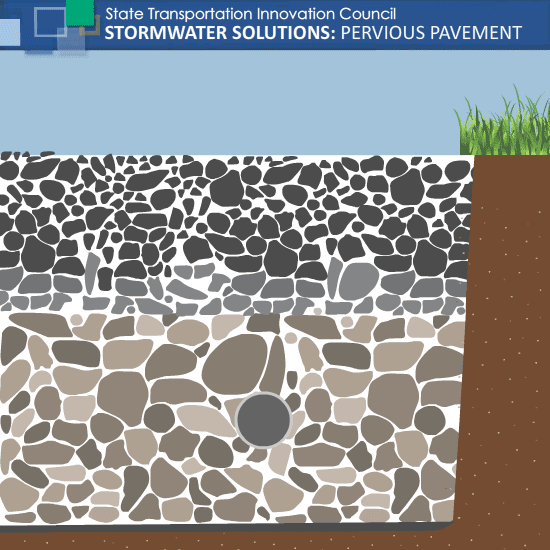While keeping its focus on maintaining and improving the state's large network of highways and bridges, PennDOT continues to address both multimodal and environmental needs through the use of pervious pavement.
A product of collaboration through the
State Transportation Innovation Council (STIC), pervious pavement installation is helping advance improvements to parking lots and trails at various locations across Pennsylvania while meeting stormwater management goals.
"This program reflects our ongoing commitment to pursue innovative solutions to the varied challenges we face managing the far-flung transportation network across Pennsylvania," said Lydia E. Peddicord, P.E., chief of the Pavement Design and Analysis Unit in PennDOT's Bureau of Project Delivery.

Pervious pavements provide a valuable stormwater management benefit to help offset the costs of constructing and maintaining traditional Stormwater Control Measures, like retention basins. Asphalt and concrete pervious pavements allow water to pass through the surface and temporarily settle in a stone reservoir before infiltrating into the ground. Although not appropriate for high-traffic volumes or high-speed roads, this "green" technology is especially useful for parking lots, pull-offs, sidewalks, center islands, and walking or biking trails where heavy loads are not expected.
Maintenance of pervious pavement is an important component of its durability and benefits. Debris and sediment may lodge in the pavement pores and significantly slow water drainage. On an annual basis, pressure washing or vacuuming the surface ensures permeability. Regular inspection and permeability testing are also recommended.
Through the STIC, PennDOT updated Publications 23, 242, 408 and 584, which paved the way for this application to be used statewide.
Pennsylvania has seen pervious pavement projects since 2011. Projects included one in Fairmount Park in Philadelphia, near the Delaware Canal in Bucks County, the Hellerstown Streetscape in Northampton County, the Uwchlan Township Trail in Chester County, a parking lot at the Benjamin Rush State Park in Philadelphia, the K & T trail in Philadelphia, the East Coast Greenway in Delaware County, the Fort Hunter Connector project on The Capital Area Greenbelt in Harrisburg, and a parking lot and trail section in Ohiopyle State Park in Fayette County. Pervious pavement projects have been completed and are ongoing for the Paoli Pike Trail in Chester County.
Adding pervious pavement to a section of the Schuylkill River Trail in Chester County is slated for next year.
Among the local pervious pavement projects is the construction planned for this year of 3,500 linear feet of multi-use trail within a community park in Lower Makefield Township, Bucks County. The project includes the conversion of 500 linear feet of the existing trail and 24 parking spaces to pervious pavement. The municipality also maintains a pervious pavement surface adjacent to the park.
Why are pervious pavements an important tool? Preventing excessive stormwater runoff helps replenish groundwater, which accounts for 56 percent of Pennsylvania's water supply, especially in rural areas of the state. Every acre of land that is covered with an impervious surface generates 27,000 gallons of surface runoff instead of groundwater recharge during a one-inch rainstorm.
For more information, visit the
Pervious Pavement page on the STIC website.